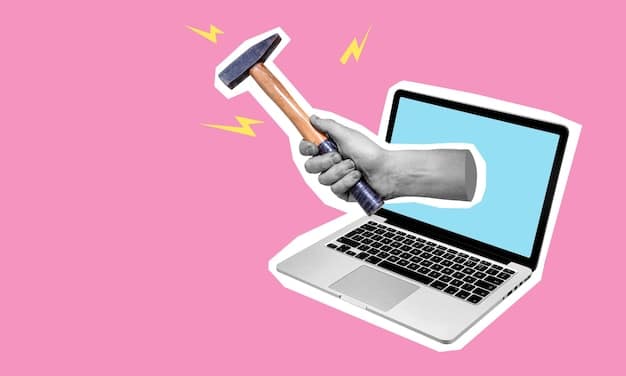Copyright Law Changes: Impact on US Online Content Creators

Recent updates to copyright law in the US are poised to significantly impact online content creators, potentially altering how they create, share, and protect their work.
The landscape for online content creators in the US is constantly evolving, especially with recent changes to copyright law. Understanding these updated copyright law amendments passed is crucial for anyone creating or sharing content online, as they have significant implications for creators’ rights and responsibilities.
Understanding the Recent US Copyright Law Amendments
The recent changes to copyright law in the US represent a significant shift in how online content is regulated and protected. These amendments aim to address challenges posed by the digital age, where content can be easily copied, shared, and repurposed.
These changes are not just theoretical; they have real-world implications for content creators. Let’s delve into the specifics of these amendments, what they entail, and why they matter to the creative community.
Key Changes to Copyright Law
Several key changes have been introduced to copyright law in the US. These revisions target critical areas in digital copyright management.
- Extended Copyright Protection Terms: Some amendments extend the duration of copyright protection, ensuring that creators and their estates retain rights over their work for longer periods.
- Strengthened Penalties for Infringement: The law now includes stricter penalties for online copyright infringement, helping content creators protect their intellectual property more effectively.
- Clarified Fair Use Guidelines: There is an effort to clarify fair use guidelines, which determines how content can be used without infringing copyright, although definitions can still vary.
These adjustments reflect an ongoing effort to balance the rights of copyright holders with the public’s interest in accessing and using creative content.
How These Amendments Affect Online Content Creators
The amendments to copyright law have a broad impact on the daily activities of online content creators. Understanding how these changes affect both their rights and obligations is essential for navigating the digital landscape successfully.
Whether you’re a blogger, vlogger, artist, or musician, these changes will influence the way you create and distribute your work.

Protecting Your Content: What’s New?
New measures have been introduced to help content creators protect their work from unauthorized use.
- Automated Takedown Notices: Creators can now issue more effective takedown notices to platforms hosting infringing content, ensuring quicker removal.
- Digital Watermarking: The amendments support the use of digital watermarking to assert ownership and track unauthorized use of content.
- Expanded Legal Recourse: The legal avenues for pursuing copyright infringement claims have been broadened, providing creators with more options for protecting their rights.
These enhancements empower creators to actively defend their intellectual property and potentially monetize their work more effectively.
Navigating Fair Use in the Digital Age
Fair use is a crucial concept in copyright law that allows the limited use of copyrighted material without permission from the copyright holder. Understanding the boundaries of fair use is particularly important for content creators who often build upon existing works.
However, determining whether a particular use qualifies as fair use can be complex and often requires careful consideration of the specific circumstances.
Understanding Fair Use Factors
The determination of fair use typically involves assessing several factors:
- Purpose and Character of the Use: Is the use transformative, adding new expression or meaning to the original work, or is it merely a duplication?
- Nature of the Copyrighted Work: Is the original work factual or creative? The use of factual works is more likely to be considered fair use.
- Amount and Substantiality of the Portion Used: How much of the original work was used, and was it the heart of the work?
- Effect of the Use on the Potential Market: Does the use harm the market for the original work?
Analyzing these factors can help content creators make informed decisions about using copyrighted material in their own creations.
Licensing and Permissions: Best Practices
In situations where fair use does not apply or is uncertain, obtaining licenses and permissions from copyright holders is essential. Properly licensing content ensures that creators can legally use copyrighted material without infringing on others’ rights.
Navigating the process of licensing and permissions can seem daunting, but understanding the best practices can streamline the process.

How to Obtain Proper Permissions
Here are some steps content creators can take to secure the necessary permissions:
- Identify the Copyright Holder: Determine who owns the rights to the material you wish to use. This might be the original creator, publisher, or another entity that has acquired the rights.
- Contact the Copyright Holder: Reach out to the copyright holder to request permission to use the material. Be clear about how you intend to use it, where it will be displayed, and the duration of use.
- Negotiate Terms: Discuss the terms of the license, including the fees, scope of use, and any restrictions. Be prepared to negotiate to reach an agreement that works for both parties.
Securing proper permissions not only avoids legal issues but also supports the original creators and their work.
Monetization and Copyright Compliance
For many online content creators, monetization is a key goal. However, it’s crucial to ensure that monetization practices comply with copyright law. Platforms like YouTube and Twitch have strict policies in place to prevent copyright infringement and protect the rights of copyright holders.
Failure to comply with these policies can result in content removal, account suspension, and even legal action.
Ensuring Copyright Compliance
Here’s how content creators can ensure their monetization efforts are copyright compliant:
- Use Original Content: The simplest way to avoid copyright issues is to create and use original content that you own.
- Obtain Necessary Licenses: If you use copyrighted material, such as music or video clips, make sure you have the appropriate licenses and permissions.
- Understand Platform Policies: Familiarize yourself with the copyright policies of the platforms you use to monetize your content, such as YouTube’s Content ID system.
By adhering to these guidelines, creators can monetize their content without running afoul of copyright law.
Future Trends in Copyright Law and Online Content
As technology continues to evolve, copyright law will undoubtedly continue to adapt to address new challenges and opportunities. Understanding the emerging trends in copyright law and online content is crucial for content creators to stay ahead of the curve.
From artificial intelligence to blockchain technology, several trends are poised to reshape the future of copyright and content creation.
Emerging Technologies and Copyright
New technologies are introducing complex questions:
- AI-Generated Content: As AI becomes capable of creating original works, the question of who owns the copyright to AI-generated content becomes increasingly relevant.
- Blockchain and NFTs: Blockchain technology and non-fungible tokens (NFTs) offer new ways to protect and monetize digital content.
- Global Copyright Enforcement: Efforts to enforce copyright laws across international borders are becoming more sophisticated, requiring creators to be aware of copyright regulations in different countries.
By staying informed about these developments, content creators can prepare for and adapt to the changing legal landscape.
| Key Point | Brief Description |
|---|---|
| 🔑 Copyright Changes | Amendments affect how creators protect and monetize content. |
| ⚖️ Fair Use | Understand the factors for legally using copyrighted material. |
| 📝 Permissions | Secure licenses to avoid infringing on others’ rights. |
| 💰 Monetization | Ensure compliance with platform policies to monetize legally. |
Frequently Asked Questions (FAQ)
▼
The main updates include extended copyright protection terms, strengthened penalties for infringement, and clarified fair use guidelines. These changes aim to modernize copyright law for the digital age.
▼
Fair use allows limited use of copyrighted material without permission. Factors include the purpose of use, the nature of the work, the amount used, and the effect on the market. Consult a legal expert when in doubt.
▼
Use digital watermarks, issue takedown notices for infringement, and secure licenses for copyrighted material used in your content. Regularly monitor online platforms for unauthorized use of your work.
▼
Giving credit does not automatically grant you the right to use copyrighted music. You need to obtain a license or permission from the copyright holder unless your use falls under fair use guidelines.
▼
NFTs can represent ownership of digital assets, but they do not automatically transfer copyright. The copyright remains with the creator unless explicitly transferred in a licensing agreement or sale.
Conclusion
Staying informed about the updated copyright law amendments passed and their implications is crucial for online content creators in the US. By understanding these changes, creators can better protect their work, navigate fair use, secure proper licenses, and ensure copyright compliance in their monetization efforts. As technology continues to evolve, staying adaptable and informed will be key to success in the digital landscape.





